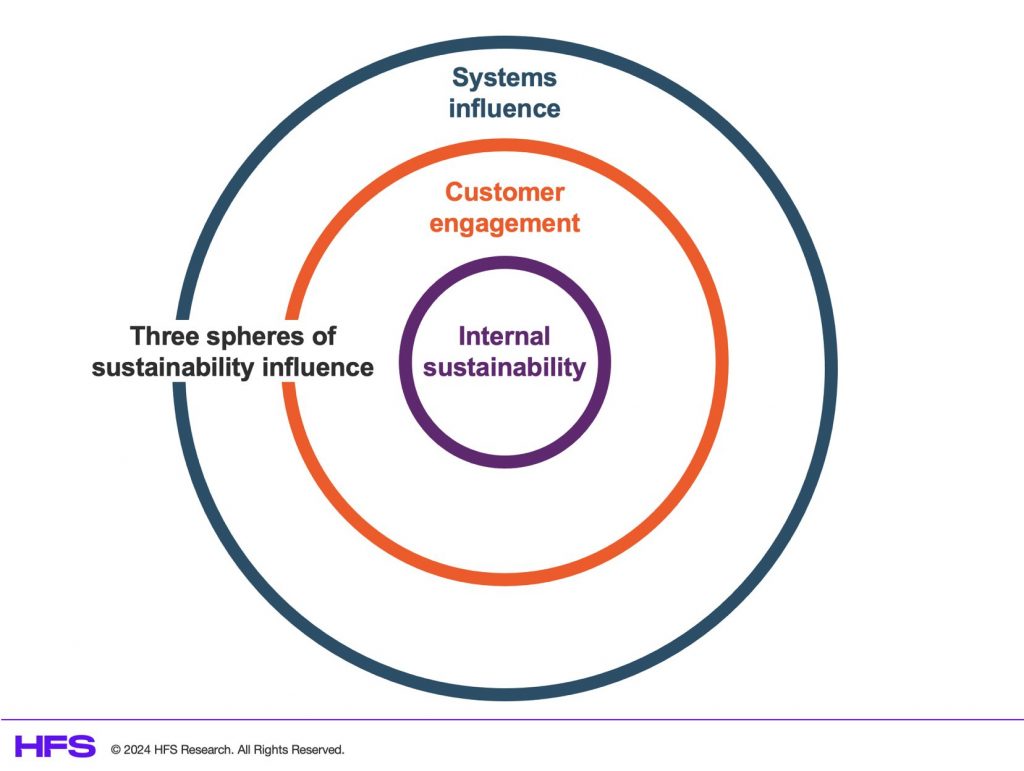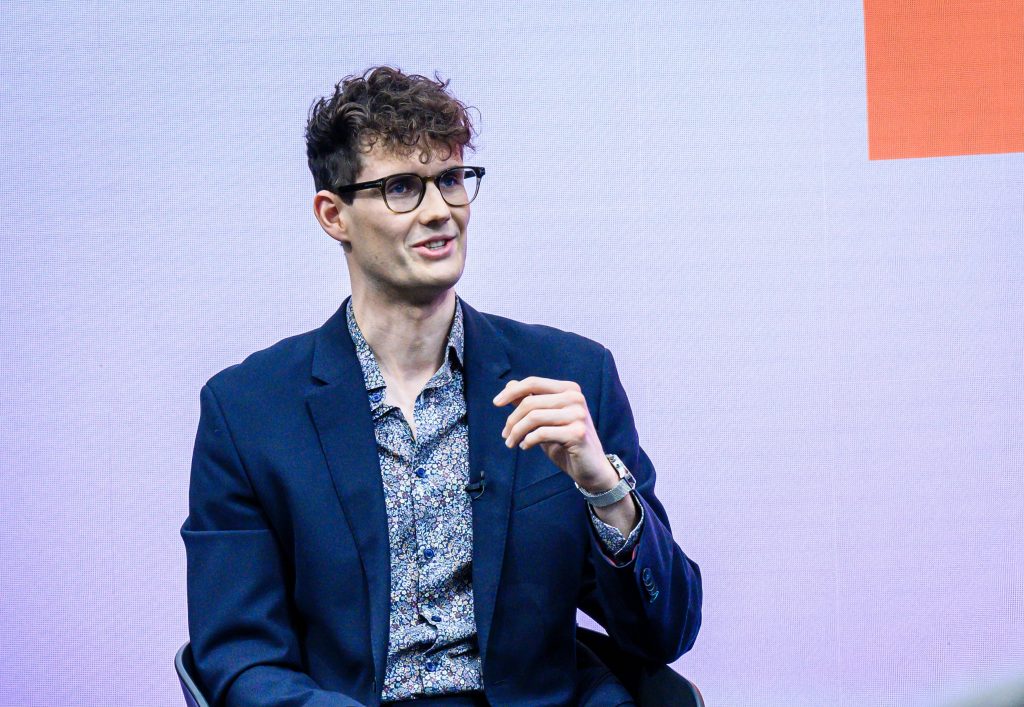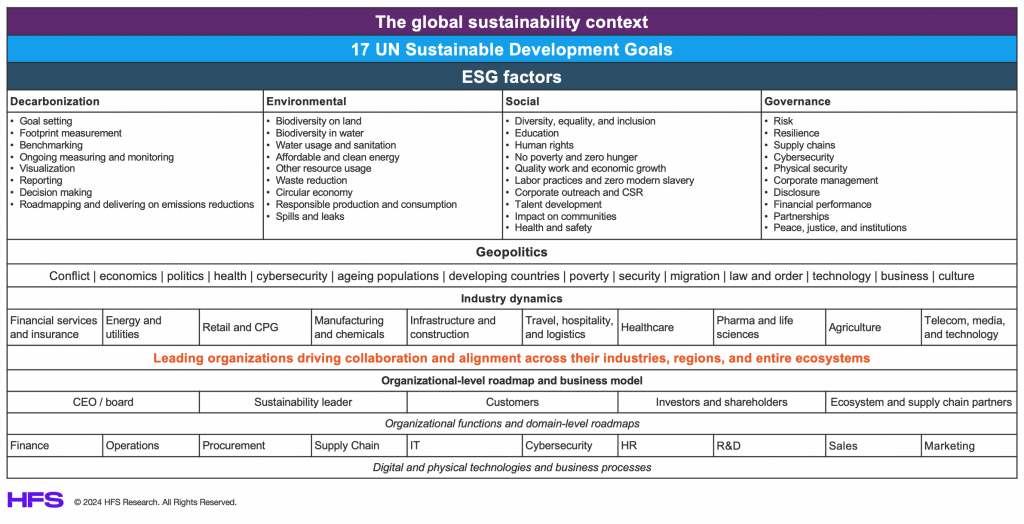Josh Matthews speaking at COP26 in Glasgow
I’m delighted to announce that the analyst who made sustainably great… is back to MAKE SUSTAINABILITY GREAT AGAIN! Yes, folks, Josh Matthews has returned to the HFS analyst family! And in time to meet many of you at the HFS AI Symposium at Cambridge University.
Josh, it’s great to have you rejoin the HFS family. It seems like you’ve had an eventful time in the outside world the past couple of years. What were the highlights? What did you learn about the world?
I’ve spent 2 years zigzagging through the different parts of the climate and sustainability emergency. I’ve come through with a clearer understanding of the global context and how the systems that need changing operate. I’ve seen the insides of large services firms, multiple climate and sustainability startups, experienced the processes and emotions of COP28, and gotten involved in climate finance and sustainable city initiatives. Having also stood for Parliament in the UK’s general election, I will continue to be involved in politics – especially tying in all things sustainability from environmental and social perspectives – linking the global context to people’s lives and local areas. I don’t think I’d be able to stand by and not have a political part of my life given the systemic change sustainability needs across policy, consumer behavior, and business. It’s exciting that HFS has always been able to influence at both a systems level and the detailed strategic, technology, and process levels that real progress needs.
I remember well the great work you did building up our sustainability coverage and the great impact we were making influencing enterprise leaders. With all the recent changes in the global economy and the sorry state of global politics, will you change your messaging/research to the world?
I’m going to tackle two ends of a sustainability spectrum which seems to be diverging more and more. On one end is the critical mass: The coming together of people and organizations to prove sustainability works in all its environmental, social, and economic ways – pulling along policymaking, consumer behavior, and business along into alignment with the trajectories of the Paris Agreement and UN Sustainable Development Goals. It’s why I set up Critical Mass for Sustainability and look forward to using it as a convening and advocacy platform alongside HFS’s research and consulting. On the other end of the spectrum, is the need to embed sustainability throughout an organization’s plans and processes. Embedding sustainability is all the more important when moving first is a tough sell to clients, employees, or the public.
The sustainability spheres of influence are still vast for companies, whatever part of their value chain they find themselves in. That is especially true for the biggest, most influential enterprises. It is also true for the biggest consulting, technology, IT, engineering, and business services firms. Their potential impact is as large as it was when we launched our Sustainability Services market analysis two years ago. Companies in every industry need to move so quickly to address sustainability. Services firms will need to be there alongside them, having understood their sectors, business models, and operations.
If services firms push their clients and partners to be a part of a critical mass then they can be the architects of the positive tipping points sustainability needs. If they can embed sustainability into their services, then they can have impact regardless of whether clients demand sustainability or not.

And what do you intend to write about in the coming months? Where do you feel enterprise leaders need attention? How do you plan to draw their attention away from other issues?
I’ll be working across the whole HFS team to keep embedding sustainability in our own research, advisory, and convening work. Whether that’s industry, technology, or business functions. I’ll continue my work of breaking down the global sustainability context and helping align people, teams, and companies. When a vast geopolitical mess confronts us all, being clear on where your spheres of influence are as a person or business – clear on what is materially impactful, not only what sounds right – is all the most vital.
I did admire how sustainability was becoming big business for leading professional services and tech firms, but that seems to be slowing. Is that really the case?
We need to show that the supposed ESG backlash or “greenlash” is nothing more than a “greenhush” at most. That doesn’t mean sustainability isn’t facing challenges. Far from it. But the arc of progress is still bending towards the Paris Agreement, net zero, and the 17 UN Goals. We’re nowhere near on track. But we’re not slowing. In fact we’re still accelerating despite all the noise and lobbying for it to be otherwise. Just to take a few examples from the past week or so… I plan on adding to this argument with HFS’s research power behind me.
A study of over 2100 C-level execs by Deloitte found 85% of them increased their sustainability investment over the past year expecting direct benefits. Published at the same time, a Bain study looked at B2B and B2C customer sustainability attitudes. Demand is high. But separate analyses of multiple reports suggest CEOs are deprioritizing sustainability when considering the multifaceted geopolitical chaos of the last few years. But de-prioritization is a loaded word – and doesn’t (or shouldn’t) always translate into spending (often priorities in surveys like this reflect what’s top of mind). The long-term implications are amplified when limiting strategic, operational, and financial resources to sustainability goals. Like trust, lost sustainability momentum and progress can take a long time to build back.
The Deloitte study actively shows there is no material de-prioritization but an acceleration of spending and action. Also consider that the “public facing” de-prioritization in rhetoric from some CEOs and firms confronted with a volatile and unpredictable US election… might not be translating entirely into the work of other execs and operational leaders as they press on. (Also also, IRA money is unlikely to go anywhere given its allocation in Red states and their broader economic potential for sustainable energy and infrastructure).
The demand for sustainability talent is also hot as LinkedIn’s own analysis recently showed.
Sadly many businesses and politicians worldwide have found it far too easy to accept the idea of an ESG backlash – because sustainability is hard. Sustainability can work on all environmental, social, and economic fronts. And those who prove that will be a part of the critical mass that creates positive tipping points and pulls along policy, consumers, and businesses. But that doesn’t mean sustainability is easy or the immediate business case is always obvious.
We need to think transition plans.
We know where we’re heading – the UN Sustainable Development Goals (SDGs) make for terrific roadmap endpoints. And even if all the data isn’t available, there are enough examples of success out there to work out what’s material to your business and to sustainability – to know your starting point and move forwards on the trajectories of the SDGs and Paris Agreement. The near future timeline for sustainability is uncertain, but the long-term timeline is not. It cannot be.
And finally, Josh, the biggest negative impact of AI is the sheer amount of energy required to fuel these scaling LLMs and power these Nvidia chips. Where do you see this all going? Is AI really worth it, or are there things we can do to minimize the negative impact?
Judging by the progress of Google, Amazon, Microsoft, et al. on procuring and building immense amounts of renewable electricity generation – the emissions footprint of technology use doesn’t worry me as much as other factors. Solar and wind are proven technologies and are cost effective at vast scale – we just need to build more. The material and industrial waste footprints are far from solved however. Industrial waste is roughly 95% of global waste – with 5% coming from consumers. Even in the UK where services dominate, consumer waste is maybe 10-15% at most. How we store all the solar and wind energy required for not only digital technologies but a more electrified future is also an outstanding challenge. Battery technology is improving but is far from where we need. Grids need upgrading – both physically AND digitally – which is where AI and other digital twin, IOT, and analytics technologies can find a powerful role.
Social impacts of AI and the whole sustainability transition will require careful planning.
Sustainability goes well beyond decarbonization and net zero to all environmental challenges including waste – industrial especially – water, biodiversity, and more. It also goes deeply into our societies. Social sustainability cannot just be corporate social responsibility (CSR) projects but must include a range of measures from a duty of care to your own employees’ wellbeing, to ensuring a just energy transition that works for the least advantaged most of all. Economically we must collectively work out where the upfront capital for sustainability comes from. In the long run everyone will benefit from a transition to the UN Goals – but the upfront costs must be derisked and be shared by those who can afford them. There’s a fantastic IEA report which delves into this from an energy transition angle.
HFS Research has been at the forefront of emerging technology for well over a decade.
From the rise of process automation to all things digital transformation to sustainability and now Generative AI. Cutting through hype and pointless press releases. Focusing on outcomes. Focusing on case studies. On what works. On what could work.
Sustainability needs that approach more than ever. Systemic change. And embedding sustainability to pull along those who haven’t yet found their own case for change.
Can’t wait 😁
Posted in : Artificial Intelligence, Climate Cange, Data Science, Energy, Manufacturing, sustainability








